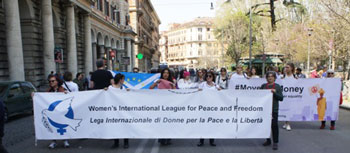Europe is on a crossroad in 2017 – cooperation and benefits are at stake. 60 years after the Rome treaty, the EU has lost credit for women believing in peace and justice, welfare and safety, participation and inclusion!
Our feminist vision has always been and is inclusive, equal, democratic, just, sustainable and peaceful. This is a commitment to pluralism, diversity and the guarantee of rights. This is the link from WILPF’s past to the future.
Of course we were not naive and thought that EU would bring about big progress for women’s rights and freedoms.
We believed and still believe:
- in the necessity to overcome together nationalisms and traumata from the war, to strengthen cross-border cooperation and networking, to promote mutual trust and solidarity in an open and secular society.
- that EU is not just a space for money and markets and that Europe is more than the EU. Europe is the home of its citizens and those who have found and find refuge and home here because they had to leave their countries and environments.
- that it is part of our cultural heritage that people were capable to destroy walls and to ensure fundamental freedoms and democratic rules on the basis of equal participation of women and men .
- that most Europeans have understood lessons from the colonial past to respect universal human rights and- as part of a global responsibility – to contribute to a healthy natural environment without harming the planet and without exploiting people.
- that in the women’s analysis of the root causes of war, economy must serve the needs of the people and not those of profit and interests of a few. In the sense of Human Security, a strong investment in conflict prevention is the only way to avoid violence and to protect women.
Challenges that urge women in 2017 to stand up for a peaceful and just future:
EU is at the core of an economic model, which has widened inequalities and injustice all over the world. The gap between rich and poor is growing globally and within our societies. The dominance of corporate interests, austerity measures, unjust tax systems, lack of and dismantling of social and health services – including reproductive rights – are threatening the basis of our commons, women’s rights, participation and independent living.
EU is turning into a space for exclusion where governments build new walls, organize “efficient” pushbacks for refugees, make deals with undemocratic leaders to create new “secure” countries of origin and continue to militarize the fortress Europe. These policies are often in contradiction to international law and human rights obligations.
EU is full of fear pushed by “populist/nationalist” politicians and right wing media. They confront women – not only with old forms of patriarchy – but allow new forms of discrimination, “othering”, “anti-gendering”, open racism and hate. Many people are looking for authoritarian leaders who sell “easy” solutions to complex problems.
The level of consumption and production in the EU and Europe accelerates climate change and is the source of conflict, hunger and forced migration.
EU is faced with an on-going militarisation through the implementation of the new EU “Global Strategy”, the outsourcing of the security business and border management to NATO. The increase of military budgets in the member states, the equipment with new generations of weapons and a nuclear revival where the logic of deterrence is extremely dangerous.
WILPF women work for changes
WILPF is the oldest women’s peace organisation. In the spirit of our foremothers and aware of actual dangerous developments, we are convinced that it is urgent to advocate for another Europe, peaceful and just. We met in Rome to reaffirm our role of agents of change. We affirm our courage to express complex answers to complex and globalised issues. We are working cross-border with our Sections in Europe and neighbouring regions, in multiple networks and a global responsibility. We continue to address root causes of war and violence with a gender lens and mobilize for non-violent action.
We appeal to our governments and to the EU institutions
- Move the money from war to peace! Invest the money where it is needed for the people: in social security, education, health and equality!
- Stop arms trade to conflict regions and globally (CEDAW in relationship to GBV) and reduce the production of arms (SALW and of mass-destruction)
- Participate actively in the nuclear disarmament negotiations that start now.
- Dismantle NATO, de-nuclearize Europe and stop the logic of deterrence.
- Invest in a Global Strategy which gives priority to prevention and avoid further militarisation of our societies.
- Implement the UN Sustainable Development Goals (SDGs) with specific attention to goal 17.
- Create an asylum law respecting not only human rights and international law but giving priority to protection, specific needs and shelters for women and girls against patriarchal structures and gender-based violence in their countries, on the move and in the countries of arrival. Refugee women must be integral part of NAPs 1325.
- Respect the Women, Peace and Security/WPS Agenda while implementing UN Security Council Resolution 1325 without using it for military purposes!
- Support women’s projects, cooperation, feminist research and peace education as part of a culture of peace.
- Promote new models of consumption and production, “degrowth” and commons.
- Respect the importance of gender equality and care economy in our societies as part of an early warning mechanism for a peaceful and just society.
- Ratify the Istanbul Convention and implement adequate protection measures against sexualised violence!
- Contribute actively to measures to stop climate change through the full implementation of the Paris Agreements with a gender-just agenda.
- Promote 1000 ideas and visions to support a Europe of its citizens: European days in schools, institutions, European civil services, more Erasmus and other exchange programs, cheap “Interrail,” cross border festivals, creation of European media.
